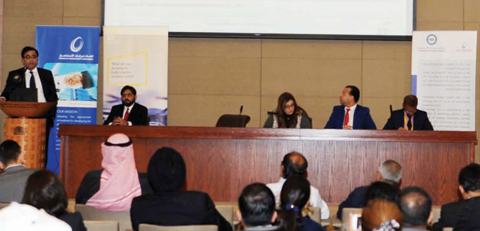Govts in Mideast toying with idea of new taxation methods: Expert
 KUWAIT: Investment Studies Institute (ISI) in collaboration with EY holds a seminar on VAT. — Photos by Yasser Al-Zayyat
KUWAIT: Investment Studies Institute (ISI) in collaboration with EY holds a seminar on VAT. — Photos by Yasser Al-Zayyat
KUWAIT: Governments in the Middle East and North Africa are experimenting with new taxation methods in a bid to ratchet up their assets and maintain economic stability, an international tax expert said yesterday at Chamber of Commerce. The tax advisory service agent at Ernst and Young (EY) Alok Chugh said that Kuwait will start preparing to impose value added tax (VAT).
Speaking at a seminar organized by the Investment Studies Institute (ISI) in collaboration with EY about VAT, Chugh explained that EY is the tax advisor on VAT for GCC states and that the new tax would be in effect by the beginning of 2018, with educational and banking services and basic foodstuff exempted, adding that the law is to be refereed to parliament today.
The GCC unified VAT agreement was published on 21 April 2017, which forms the basis of national VAT legislation in the 6 GCC member states. Considering KSA and UAE will implement VAT on 1 January 2018, GCC will witness a new tax landscape. This evolving landscape brings in queries and uncertainties in the mind of business owners and new tax payers across Kuwait and abroad, directly and indirectly.
Chugh noted that there are some very important and bold regulatory changes in Kuwait. Some of the hottest topics for discussions are Value Added Tax where all the six countries in the Gulf Cooperation Council (GCC) have signed the Master framework Agreement for implementation of Value Added Tax (VAT) in the GCC. Based on our understanding from discussions with the government officials, the 5 percent GCC VAT shall be applicable on goods and services by 2018.
"Tax Registration Number and update forms where recently, the Ministry of Finance has set up a Tax Development Follow-Up Unit (TDFU) within the Department of Inspection and Tax Claims (DIT). New tax card further and business profit tax where Kuwait is looking to introduce the New Business Profit Taxes. Based on our understanding, all Kuwaiti and foreign companies operating in Kuwait may be subject to 10 percent business profit tax under the proposed Business Profit Tax (BPT) law. The BPT is yet to be approved by the Kuwait Parliament. However, considering the recent developments in the GCC relating to the introduction of Value Added Tax (VAT), it is our current understanding that BPT is not likely to be approved before 2019," he pointed out.
He stated that the Kuwaiti authorities are working on implementation of the economic diversification strategy. This task has become quite pressing, taking into account the current financial position of Kuwait. A number of fiscal and regulatory reforms being implemented aim at reducing the economic burdens of doing business in Kuwait. The two new regimes: Kuwait Direct Investment Promotion Law and Institutionalized Public - Private Partnerships may contribute to this process both in terms of attracting foreign investment in to the country and for diversification of economy.
Director of Union Investment Companies (UIC) Fadwa Darwish said that the seminar was organized to shed more light on how VAT would be imposed on investment companies and financial establishments in Kuwait.
By Faten Omar

